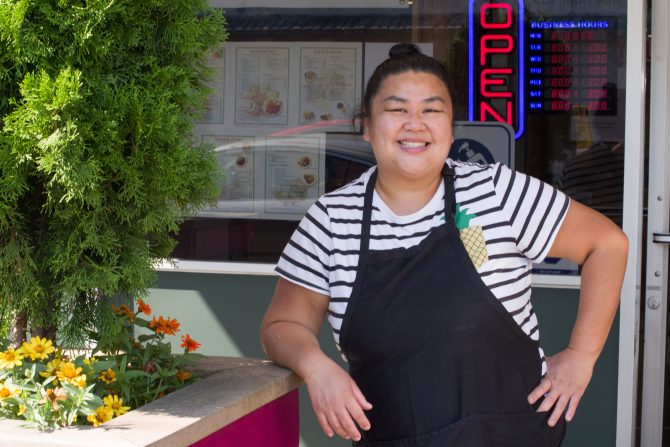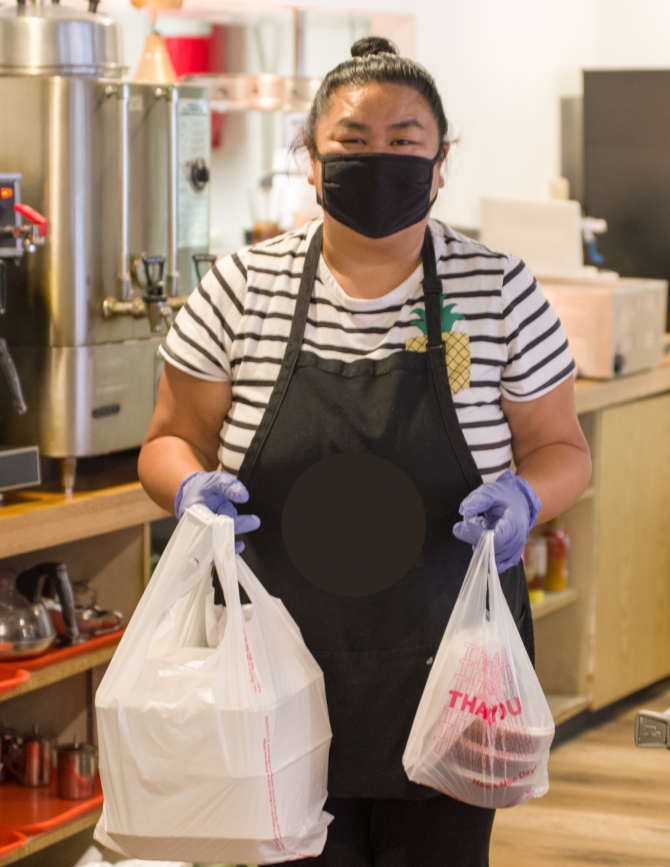In this series of interviews, we explore stories from immigrant/BIPOC*/women business owners who have adapted during the pandemic. The purpose is to learn and connect through shared experience. In this interview, Jo Anderson Cavinta (Diversity Services Coordinator at KCLS) spoke with Janice, a family restaurant owner.
*BIPOC means "Black, Indigenous, and People of Color."
Meet Janice, Family Restaurant Owner
Janice’s parents fled Vietnam during the war in the late '70s. They were “the boat people.” After staying at a refugee camp in Malaysia, they joined their sponsors in North Carolina, where they married in a Lutheran Church. Although ethnically Vietnamese, they were Chinese on paper and spoke both languages. “Our family name was Duong and they changed it to Young so they wouldn’t be made fun of.” When asked how she identifies, Janice said, “If I have three hours to explain, then I tell them I’m Vietnamese.”
“The restaurant has been in my life since day one.”
Her parents relocated to White Center. They worked, went to school, learned English and decided to open their own business. They chose a restaurant, because that way “they’ll never be hungry again and their family will always have work.” Janice works there. “The restaurant turns 38 this year, and I’m 39. There were times I resented it, but I realized it was for my future, it’s for us. They poured everything into it to make it work.” Over the years they’ve built an impressive clientele.
Then COVID-19 hit.
“We had to decide as a family do we want to stay open or do we want to close. The takeout mandate literally came overnight. We took four days off to create a game plan. Everyone was scared.” Every day there was something new that the family had to learn. Janice went to work preparing for curbside takeout. She was constantly checking the news for updates. She used her Facebook following to get information on their service from customers, “how’s my packing, what are ways we can improve?” Valuable feedback included things like only providing utensils and condiments on request, only offering soup by the quart. These were important cost-savers.
As an established business owner and someone well known in the neighborhood, Janice used her connections to help other small businesses. She learned about curbside signs available through City of Seattle and King County’s safety kits that included hand sanitizer and masks for small businesses. Their restaurant became a distribution center and source of information. Janice used her voice - literally - to support struggling businesses. “I had my bullhorn on standby. I’d stand outside their business and promote. All my Facebook posts were not just about ‘hey come to my business’ - it was about showing we’re in this together.” She couldn’t stand the thought of places in her community shutting down so she would visit other restaurants and post their food.
A turning point.
Business at the restaurant was a roller coaster. “It came in waves. Me and my sister would be sitting there waiting for calls.” In slow times, they posted on social media and called people they knew. “There were also times the phone was ringing off the hook. People who saw my posts came in. I would also go and check in with small business owners, post their hours and how they're handling things.” Janice joined the White Center business alliance and continued to use her online platform as an “outlet for positivity, food, small businesses. I just kept promoting White Center. Folks didn’t know about these businesses, but they would come back to tell me that they went to visit.”
The road ahead.
“I’m always thinking of ideas. ‘Hey mom, can we close two days instead of one?” The answer is usually no. Her parents keep them grounded on the business management side. For example, it’s cheaper to buy individually packaged condiments, use QR codes and post menus instead of printing them. “I learn from going out to eat at other places and incorporate ideas.” Janice passes this information along to other restaurant owners.
“We have to think of longevity. Everyone is going through their own battles. People are on edge.” Through it all, Janice continues to spread positivity and find ways to keep her community intact.
Janice’s Business Tip: Check the rules. For example, Seattle capped the fees that third-party delivery charges restaurants to 15%. Also, there are things you don’t need to buy. Find out where masks are being distributed for free.
Support your local small business community! For more financial and small business resources, visit Invest in Yourself.
The Welcoming Center for immigrants, refugees and new arrivals connects you to the people and resources in the area you live.



